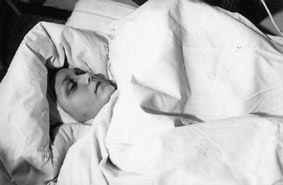. . .

On January 26, 1972, a 22-year-old flight attendant named Vesna Vulovic was not where she was supposed to be. She was cruising at 33,330 feet above Czechoslovakia (now Czech Republic) in a DC-9 airplane, but her schedule had been mixed up with that of another stewardess named Vesna, and she was subsequently placed on the wrong flight. But Vesna was happy for the mistake; it afforded her the opportunity to see Denmark, and to stay in a Sheraton Hotel, which she had always dreamed of doing. But the mix up was not so fortuitous as it seemed.
A terrorist group known as Ustashe had placed a powerful explosive on this particular plane. The Ustache was a far-right nazi/fascist group in Croatia which was implicated in over two dozen terrorist attacks against Yugoslavia after World War 2. Vesna's flight, JAT Yugoslav Flight 364, was with an airline based in Yugoslavia.
While passing over the city of Srbska-Kamenice, the explosive device detonated. The DC-9 was torn into pieces, and the plane's wreckage, along with its 28 passengers, fell through the sky for three long minutes before striking a frozen mountainside.
A German man, upon arriving at the crash site, found all of the plane's passengers dead, save one. Vesna was lying half outside of the plane, with another crew member's body on top of her, and a serving cart pinned against her spine. The man had been a medic in the second world war, and did what he could for her until further help arrived.
At the hospital, her parents were told that although there was still life in her body, she would not survive. Her skull was broken and hemorrhaging, both of her legs were broken, and she had three crushed vertebrae. But three days later, she awoke from her coma, and asked for a cigarette.
Vesna was paralyzed from the waist down, but she was alive and conscious. Two weeks after the accident, her doctor told her what had happened, and gave her a newspaper to read the story, but the memory of this event would escape her, as did everything from one hour before the accident to one month after, due to amnesia. Later, she underwent surgery that restored movement to her left leg, and a month after that, she regained movement in her right leg. Eventually, she was able to walk again.
By the following September, she was eager to go back to work, but to avoid publicity, the airline gave her a desk job. She never suffered any psychological trauma as a result of the incident, and never experienced any fear of flying. She is still alive today, and flies with some regularity. She has a positive philosophy on life, stating, "I believe we are masters of our lives - we hold all the cards and it is up to us to use them right."
Her good fortune in surviving the accident is most likely due to her low blood pressure, which caused her to pass out quickly and prevented her heart from bursting. But despite her positive outlook on life, Vesna does not consider herself lucky. Thirty years after the crash, she said to Philip Baum in an interview, "I'm not lucky. Everybody thinks I am lucky, but they are mistaken. If I were lucky I would never had this accident and my mother and father would be alive. The accident ruined their lives too." It's a valid point, along the same lines as arguing that the event wasn't a "miracle," given that there were 27 people who didn't survive. The assertion that "it could be worse" is small comfort to the pragmatic, because certainly, it could also be much better.
Vesna currently holds the Guinness World Record for the highest fall survived without a parachute, at 33,330 feet.